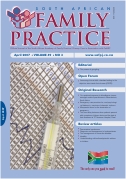Assessing clinical skills – standard setting in the objective structured clinical exam (OSCE)
Keywords:
Assessment, objective structured clinical examination, clinical skills, borderline regression method
Abstract
Family Medicine training and assessment is becoming more formalized and developed in South Africa. Assessment of competency in relation to clinical skills can involve observation in the clinical setting, but is more usually assessed in an examination. The traditional “long case has been largely abandoned as it lacks reliability and validity. Summative assessment of family physician’s clinical skills now usually includes an Objective Structured Clinical Examination (OSCE). Although a well designed and organized OSCE can have reasonable reliability and validity, a pass mark of 50% may in fact be an arbitrary figure, which does not credibly represent the required competency of a family physician. Standardisation of the OSCE is required to define the pass mark above which a candidate performs at the level expected of a family physician. A number of standardisation processes have been described that either judge the test items prior to the exam or judge the individual during the exam. In this paper we report on an example of the latter called the borderline regression method.
Published
2007-04-12
Section
Forum
By submitting manuscripts to SAFP, authors of original articles are assigning copyright to the South African Academy of Family Physicians. Copyright of review articles are assigned to the Publisher, Medpharm Publications (Pty) Ltd, unless otherwise specified. Authors may use their own work after publication without written permission, provided they acknowledge the original source. Individuals and academic institutions may freely copy and distribute articles published in SAFP for educational and research purposes without obtaining permission.

